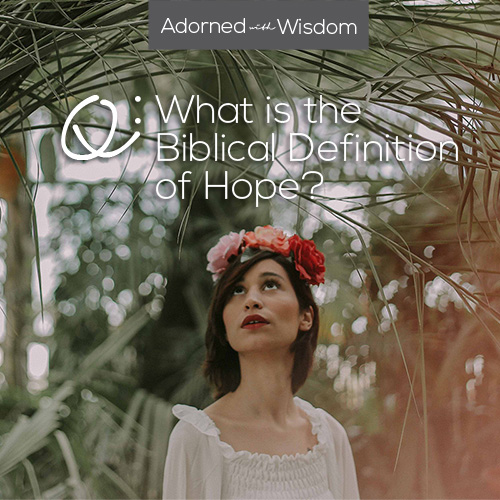Q: What is the Biblical Definition of Hope?

This Q&A series is intended to help you take steps forward in wisdom. Lay your questions before Scripture with us; find in the ashes that wisdom “will place on your head a graceful garland; she will bestow on you a beautiful crown” (Prov. 4:9). What questions about grief, God, or the Bible do you have right now? Contact us here.
 Hope. A small, four letter word that packs a powerful punch. I know this word well because hope is what I held desperately to in the hours and days after I first saw red on that crumpled up tissue paper in our tiny upstairs bathroom. I wasn’t far along with our second baby, but as any expectant momma will tell you, you don’t need to be “far along” to have fallen in love with the life growing beneath your own heartbeat.
Hope. A small, four letter word that packs a powerful punch. I know this word well because hope is what I held desperately to in the hours and days after I first saw red on that crumpled up tissue paper in our tiny upstairs bathroom. I wasn’t far along with our second baby, but as any expectant momma will tell you, you don’t need to be “far along” to have fallen in love with the life growing beneath your own heartbeat.
I hoped for a divine miracle. I prayed that the Creator of my baby’s life would also be the Sustainer. Even after test results showed that my pregnancy levels were dropping, I still clung to the hope that God would continue to grow life inside of me.
I bought half a dozen pregnancy tests and I continued to use them. Each time my eyes read “positive” on that tiny rectangle screen, I convinced myself that the bleeding would soon stop, that the test results were somehow wrong, and that the hope I was clinging to would be strong enough to bring about a miracle for my baby. And then, days later, it came. Sitting in a drugstore bathroom, I watched as that tiny little hour glass on the screen of a pregnancy test stopped its methodical blinking. “Negative.”
In the weeks and months after our loss, I wrestled with this tiny word—hope—as if it had been a close friend that I had entrusted with my deepest secrets. I felt betrayed and angry. My natural desire was to cut hope off entirely. To hope once again felt risky, and risky is exactly what hope proved to be. Our family would soon experience a second loss followed by nearly a year of negative pregnancy tests.
As I grieved the loss of my babies, God began to reveal a much greater picture of hope. I began to realize that as long as my hope remained wrapped up in the promises of this world, I would continue to be hurt. God was doing a work in my heart and cultivating a longing for a hope that only He could fill.
In author John Eldredge’s book All Things New he writes, “When you consider the pain, suffering, and heartbreak contained in one children’s hospital, one refugee camp, one abusive home or war-torn village over the course of a single day, it’s almost too much to bear. But then consider that multiplied out across the planet, over all the days in a year, then down through history. It would take a pretty wild, astonishing and breathtaking hope to overcome the agony and trauma of this world. What we ache for is redemption; what our heart cries out for is restoration.” (6).
1 Corinthians 13:13 names hope as one of the three greatest forces of human existence. Of faith, hope and love, strong hope “seizes the future that is not yet; it is the confident expectation of goodness coming to us.” (All Things New, 9). Elpis, the Greek word for hope as it is found in 1 Corinthians 13:13 is used 53 times in the New Testament and it means, “Hope or expectation for something in the future.”
Our human inclination is to hope for the promises of this world; the degree one has been working towards, the wedding one has been planning, the baby that has been long anticipated. None of these are bad by any means. But the hope that ultimately fulfills is the eternal hope in Jesus.
Considering this kind of hope—Elpis—gives me joy in the midst of grieving, when I think of a future with Jesus and my babies in eternity. My babies have been spared the agony of this world and they are present with Jesus, free of pain and sorrow. They are already experiencing the redemption and restoration that my heart daily longs for. I now hope and long for the day when I too will experience eternity with them. When the hope of this world fails me, I remain anchored in the hope that is in Jesus. Hebrews 6:19 (HCSB) says, “We have this hope as an anchor for our lives, safe and secure.”
It is also important to mention that this greater hope was set in motion long before Jesus ever walked the earth. Throughout the Old Testament, one of the Hebrew words for hope (tiqvah) is used to describe what sustained the Israelites as they trusted God for deliverance from their enemies and hoped for a coming Savior to save them from their sins. David writes in Psalms 62:6, “Truly He is my rock and my salvation (tiqvah), He is my fortress, I will not be shaken.”
A verse that I have held especially near to my heart is Proverbs 13:12 which says, “Hope deferred makes the heart sick, but a longing fulfilled is a tree of life.” Exactly one year ago, I was just days away from giving birth to a baby girl that our family had spent 18 months waiting in expectation for. We gave Evelyn the middle name Hope after this verse in Proverbs.
It is important to mention that while Evelyn’s life is and was an answer to many prayers, our hope has not been found in her life but rather in the Giver of her life. When I look at Evelyn, I am reminded daily of a hope that is greater than any gift of this world. Evelyn’s life serves as a testament to point me back to the Scriptures that teach me of the eternal meaning of hope which is ultimately in Jesus.
- Brittany
Hope Mom to Finley Sky and Asher Simeon
Brittany and her husband, Jeremy live in Colorado with their two children Mackenzie and Levi, their Black Lab puppy Boston and a menagerie of bunnies! They have two Hope Babies, Finley Sky and Asher Simeon. Brittany is passionate about encouraging women to live authentically and abundantly. She is a writer at www.littlemountainmomma.com where she shares openly about her journey through postpartum depression, her experiences of infant loss and their prayers to grow their family again someday.
Are you a writer who would like to join the blog team? Learn more and apply here.
Widget not in any sidebars


Got something to say?